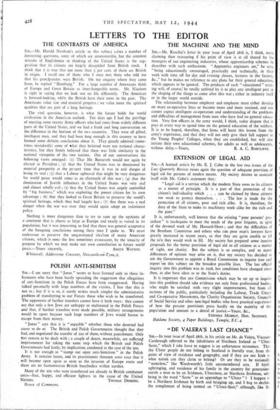EXTENSION OF LEGAL AID
Six,—A learned article by Mr. E. J. Cohn in the last two issues of the Law Quarterly Review raises again the question of adequate provision of legal aid for persons of 'modest means. My society desires to associate itself with Mr. Cohn's statement that: " Legal aid is a service which the modern State owes to its citizens as a matter of principle. It is a part of that protection of the citizen's individuality which . . . can be claimed by those citizens too weak to protect themselves. . . . The law is made for the protection of all citizens, poor and rich alike. It is, therefore, the duty of the State to make its machinery work alike for the rich and the poor."
It is, unfortunately, well known that the existing " poor persons' pro- cedure " is inadequate to meet the needs of the poor litigants, in spite of the devoted work of Mr. Hassard-Short ; and that the difficulties of the Bentham Committee and others who run poor man's lawyers have greatly increased in recent years, so that they are quite unable to fill the ro'e they would wish to fill. My society has prepared some interim proposals for the better provision of legal aid to all citizens as a matter of right, not charity. But the subject is so complex, and so many differences of opinion may arise on it, that my society has decided to ask the Government to appoint a Royal Commission to inquire into and report 'on this subject on the broadest pcissible lines. The last official inquiry into this problem was in 1928, but conditions have changed since then, as also have ideas as to the State's duties.
It is important that any Commission which may be set up to inquire into this problem should take evidence not only from professional bodies, who might be satisfied with very slight improvements, but from all sections of the public, particularly including the Labour, Trade Union and Co-operative Movements, the Charity Organisation Society, Councils of Social Service and other non-legal bodies who have practical experience of how the present provisions press hardly on the majority Of the popu'ation and amount to a denial of justice.—Yours, &c.,


























 Previous page
Previous page